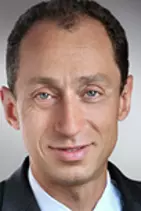The 49th World Economic Forum ended on Friday (25 January) in Davos having brought together over 3,000 decision-makers, academics and business leaders for four days on the theme of "Shaping a Global Architecture in the Age of the Fourth Industrial Revolution".
Laurent Auguste, Veolia’s Senior Executive Vice President Development, Innovation and Markets, presented the various partnership and integration strategies developed by the Group "for a large-scale transition to the circular economy".
An alliance to eliminate plastic waste in the environment
Laurent Auguste introduced the new Alliance to End Plastic Waste at the "Leadership in Action meeting” of the WBCSD (World Business Council for Sustainable Development). This Alliance - of which Antoine Frérot, Veolia Chairman and CEO, is the vice president - aims to eliminate plastic waste in the environment and develop a circular plastic economy by integrating all the stakeholders of the value chain (producers, users and recyclers).

A pressing need and an opportunity to act to protect the oceans
Speaking during the roundtables "Building global resilience through the oceans" and "Mobilizing capital for sustainability and resilience", Laurent Auguste stated that 8 million metric tons of plastic are released into the ocean each year, particularly exposing coastal communities. The unprecedented awareness and mobilization to tackle plastic pollution now being seen is able to address this environmental issue and at the same time create positive economic and social impacts.
"We need to create new partnerships combining technologies and new business models. We also have to mobilize the investment community to solve the problem of plastics in the oceans and thus create what could be the first real large scale circular economy loop," he explained.
Une alliance pour l’économie circulaire de l’alimentation et de l’agriculture
At the WEF’s Circular Economy Leadership Meeting, Laurent Auguste and Svein Tore Holsether, CEO of the group Yara specializing in crop nutrition, presented the new Nutrient Upcycling Alliance and the two groups’ nutrient recycling partnership: "After a 3-year mobilization phase to create unprecedented inter-sectoral collaboration and drive innovation for a change at the food system level, it is about connecting the food and bio-economy sectors with the circular economy," added Laurent Auguste. Veolia and Yara have invited all players in the sector to join the new Nutrient Upcycling Alliance for a fundamental overhaul of the food value chain.
Finally, the new Cities and Circular Economy for Food report from the Ellen MacArthur Foundation was published during the Davos Forum. Written under the WEF Mainstream project, it aims to design a circular food economy for urban areas. Veolia helped prepare this report, the preface of which was signed by Antoine Frérot: "Transforming organic waste into compost, fertilizer or energy is a concrete circular economy solution that can today be deployed on a large scale.”
More :
> Circular cities: creating local loops to generate local value
> #LivingCircular from Veolia
> Plastic recycling: a key link in the circular economy
> World Oceans Day: Veolia is showcasing its solutions for fighting against pollution in the seas and oceans (8 June 2018)
> World Environment Day - Veolia is committed to beating plastic pollution (5 June 2018)
>Veolia’s mission: “resourcing the world”
> Davos 2019: World Economic Forum


